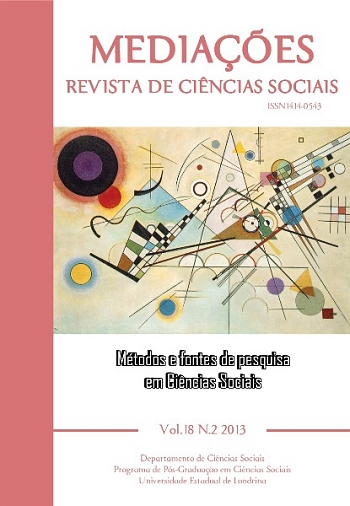Critical theory and domination in the work of Moishe Postone
DOI:
https://doi.org/10.5433/2176-6665.2013v18n2p118Keywords:
Marxism, Critical Social Theory, Domination, LaborAbstract
In this article we intend to analyze central aspects of Moishe Postone’s thinking, in special some ideas of his book Time, Labor and Social Domination (1993). Postone is an original historian and thinker in critical social theory, whose researches undertake to reinterpret Karl Marx, particularly the mature Marx of the Grundrisse. According to Postone, traditional Marxism has proven historically unable to perceive the distinctions between value and wealth as well as distribution and consumption. Moreover, Postone’s critical theory proposes an understanding of domination that differs considerably from traditional Marxism’s, posing significant challenges for contemporary social theory.Downloads
References
ANDERSON, Perry. Considerações sobre o marxismo ocidental. São Paulo: Brasiliense, 1989.
CAMARGO, Sílvio. Axel Honneth e o legado da teoria crítica. Revista Política & Trabalho João Pessoa, n. 24, p. 123-138, 2006.
CAMARGO, Sílvio. Trabalho imaterial e produção cultural: a dialética do capitalismo tardio. São Paulo: Annablume, 2011.
GORZ, André. O imaterial. São Paulo: Annablume, 2005.
HABERMAS, Jürgen. Conhecimento e Interesse. Rio de Janeiro: Zahar, 1982.
HEGEL, Georg Wilhelm Friedrich. Fenomenologia del espiritu. México: FCE, 1987.
HORKHEIMER, Max. Teoria tradicional e teoria crítica. São Paulo: Abril, 1983. Coleção Os Pensadores.
JAMESON, Fredric. Archaelogies of the future. London: Verso, 2005.
KURZ, Robert. Razão sangrenta. São Paulo: Hedra, 2010.
LÓPEZ, Sílvia L. Para una teoría crítica del presente: en conversación con moishe postone sobre las nuevas lecturas de MARX, la crisis y el antisemitismo. Constelaciones Revista de Teoria Crítica, Madrid, v. 4, p. 376-403, dic. 2012.
MARCUSE, Herbert. A ideologia da sociedade industrial. Rio de Janeiro: Zahar, 1978.
MARX, Karl. Grundrisse: Foundations of the critique of political economy. Middlesex: Penguin Books, 1989.
NEGRI, Antonio; LAZZARATO, Maurizio. Trabalho imaterial. Rio de Janeiro: DP & A, 2001.
POLLOCK, Frederich. State capitalism: its possibilities and limitations. In: BRONNER; Stephen; KELLNER, Douglas (Ed.). Critical theory and society. New York: Routledge, 1989. p. 95-118.
POSTONE, Moishe. Crítica, estado e economia. In: RUSH, Fred (Org.). Teoria crítica. São Paulo: Idéias e Letras, 2008. p. 203-233.
POSTONE, Moishe. Critique and historical transformation. Historical Materialism, Leiden, v. 12, n. 3, p. 53-72, 2004.
POSTONE, Moishe. History and heteronomy: critical essays. Tokyo: UTCP: 2009.
POSTONE, Moishe. Marx reloaded: Repensar la teoria critica del capitalismo. In: RIESCO, Alberto; LOPEZ, Jorge Garcia (Ed.). Madrid: Traficantes de Sueños, 2007.
POSTONE, Moishe. Necessity, labor and time: a reinterpretation of the marxian critique of capitalism. Social Research, New York, n. 5, p. 739-788, 1978.
POSTONE, Moishe. Rethinking Marx (in a Post-Marxist World). In: CAMIC, Charles (Ed.). Reclaiming the sociological classics. Oxford: Blackwell, 1995. p. 45-80.
POSTONE, Moishe. Thinking the global crisis. The South Atlatic Quarterly, Durham, v. 111, n. 2, p. 227-249, 2012.
POSTONE, Moishe. Time, labor and social domination. Londres: Cambridge University Press, 2003a.
POSTONE, Moishe; SANTNER, Eric (Ed.). Catastrophe and meaning. Chicago: The University of Chicago Press, 2003b.
VOIROL, Olivier. Teoria crítica e pesquisa social: da dialética à reconstrução. Novos Estudos Cebrap, São Paulo, n. 93, p. 81-99, 2012.
Downloads
Published
How to Cite
Issue
Section
License
Copyright on articles published in Mediações belongs to the author(s): in the case of partial or entire republication of the original publication, we ask author(s) to indicate the original publication in the periodical.
Mediações uses the Creative Commons Attribution 4.0 International license, which allows Open Access, enabling any user to read, download, copy and disseminate its content so long as adequately referenced.
The opinions expressed by the author(s) are their sole responsibility.
































